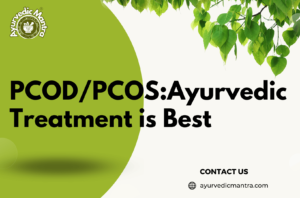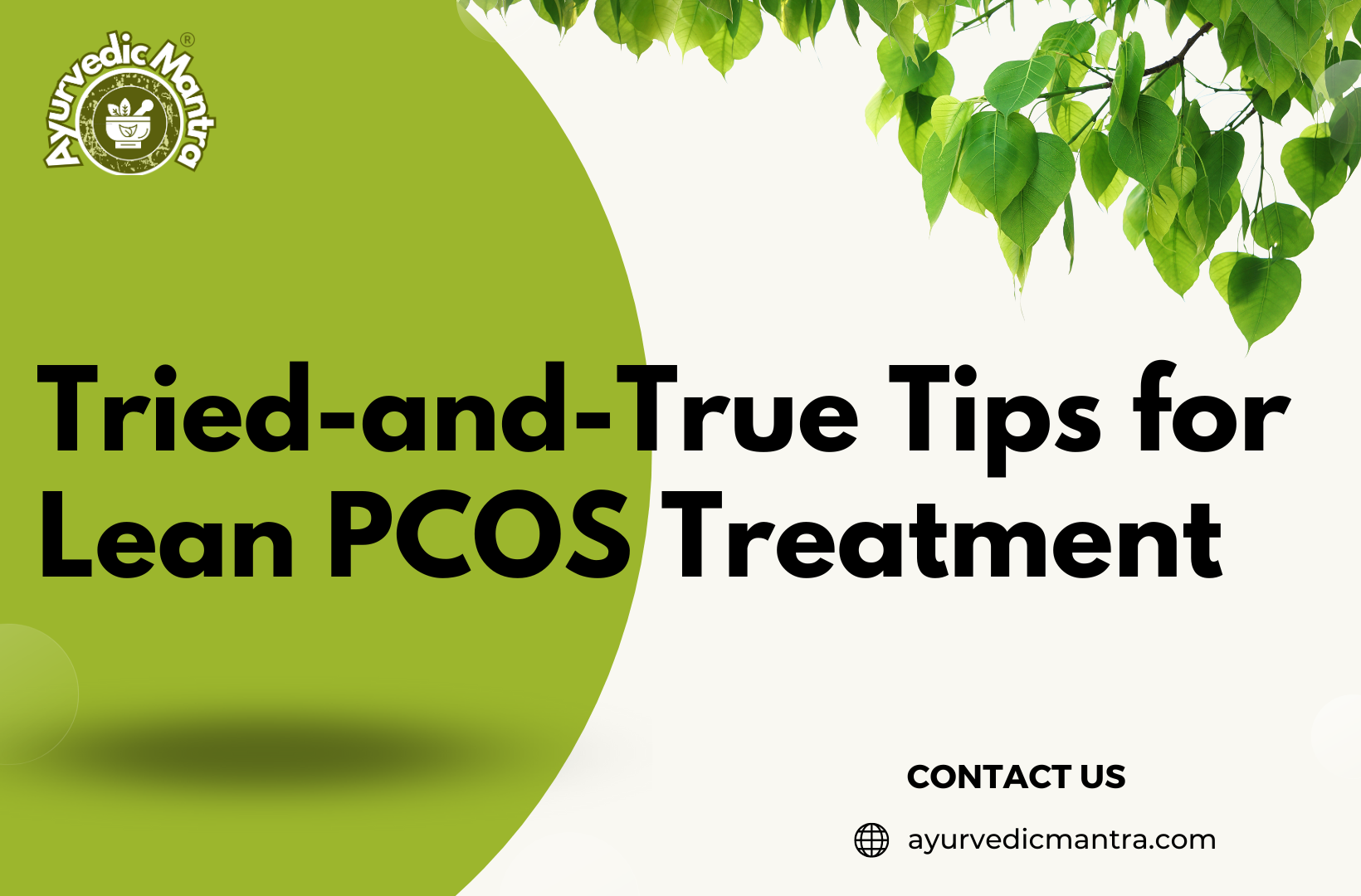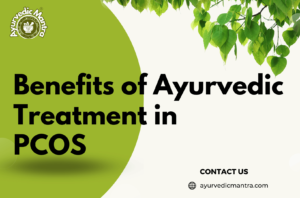
PCOD/PCOS: Ayurvedic Treatment is Best
Introduction Polycystic Ovary Disorder (PCOD) or Polycystic Ovary Syndrome (PCOS) is a common endocrine disorder affecting millions of women worldwide. It leads to hormonal imbalances,


Polycystic Ovary Syndrome (PCOS) is a complex hormonal disorder affecting many women worldwide. While PCOS is commonly associated with weight gain, it’s essential to recognize that not all individuals with PCOS are overweight. Some women have what’s known as “lean PCOS,” which presents its own set of challenges and considerations. If you or a loved one is dealing with lean PCOS, this article provides valuable insights and tips for effective management.
Lean PCOS, also referred to as “lean-type” or “atypical” PCOS, occurs when individuals with PCOS have a relatively normal body mass index (BMI) and may not exhibit the typical signs of obesity often associated with the condition. Despite the absence of significant weight gain, lean PCOS can still lead to irregular menstrual cycles, fertility issues, and excessive production of androgens, the so-called male hormones.
A well-balanced and nutritious diet plays a crucial role in managing lean PCOS. Focus on whole foods, including many fruits, vegetables, lean proteins, and whole grains. Fiber-rich foods can help regulate blood sugar levels and support weight management, even if weight isn’t a primary concern. Consider incorporating these into your diet:
Regular physical activity offers numerous benefits for individuals with lean PCOS. Exercising like brisk walking, swimming, or yoga can help improve insulin sensitivity, regulate hormonal levels, and manage stress. Aim for at least 150 minutes of moderate exercise per week, and find activities you enjoy to make it a sustainable routine.
Achieving hormonal balance is a central goal in managing lean PCOS. Consult with a healthcare professional to discuss potential treatment options, which might include:
Adequate sleep is often underestimated but plays a pivotal role in overall health and hormonal regulation. Prioritize a consistent sleep schedule, create a calming bedtime routine, and ensure your sleep environment is comfortable and conducive to restful sleep.
In conclusion, lean PCOS may not manifest in the same ways as traditional PCOS, but its impact on hormonal balance, fertility, and overall well-being can be just as significant. Adopting a holistic approach that includes a balanced diet, regular exercise, and targeted treatments can effectively manage lean PCOS and enhance your quality of life. Remember, each individual is unique, so consulting with a healthcare provider is crucial to tailor a treatment plan that addresses your needs and goals. Empower yourself with knowledge and take proactive steps towards better health and well-being, even in the face of lean PCOS.
Lean PCOS, also known as lean-type PCOS or atypical PCOS, is a variation of polycystic ovary syndrome where individuals have a relatively normal body mass index (BMI) and may not exhibit the typical signs of obesity associated with traditional PCOS. Despite the absence of significant weight gain, lean PCOS can still lead to irregular menstrual cycles, fertility issues, and excessive production of androgens, which are male hormones. The primary difference lies in the physical presentation and the specific challenges those with lean PCOS face.
Yes, lean PCOS can indeed affect fertility. While weight-related factors may differ in lean PCOS compared to regular PCOS, the hormonal imbalances and irregular menstrual cycles that characterize lean PCOS can still interfere with ovulation and make it challenging to conceive. Seeking medical guidance and adopting a holistic approach to managing lean PCOS can enhance fertility prospects.
Diet plays a vital role in managing lean PCOS. A well-balanced and nutritious diet can help regulate blood sugar levels, improve insulin sensitivity, and support hormonal balance. Focus on consuming whole foods rich in nutrients, such as leafy greens, lean proteins, and high-fiber options like whole grains and legumes. A healthy diet can contribute to weight management, even if weight is not a primary concern in lean PCOS.
Engaging in regular physical activity is crucial for managing lean PCOS. Exercises focusing on improving insulin sensitivity and reducing stress can be particularly beneficial. Consider activities like brisk walking, swimming, cycling, or yoga. Aim for at least 150 minutes of moderate exercise per week, and choose activities you enjoy and can sustain over time.
Yes, some natural supplements have shown promise in managing lean PCOS symptoms. Inositol, a B-vitamin-like compound, has been studied for its potential to improve insulin sensitivity and regulate menstrual cycles. Omega-3 fatty acids, found in sources like fatty fish and flaxseeds, may also have anti-inflammatory effects that could benefit those with lean PCOS.
Stress can indeed impact lean PCOS and its symptoms. Chronic stress can contribute to hormonal imbalances and exacerbate symptoms such as irregular menstrual cycles and excessive androgen production. Practicing stress-reduction techniques such as meditation, deep breathing, and mindfulness can help manage stress and improve overall well-being.
Adequate sleep is essential for hormonal regulation and overall health, including lean PCOS management. Poor sleep can disrupt hormone levels and contribute to insulin resistance. Establishing a consistent sleep schedule, creating a relaxing bedtime routine, and ensuring a comfortable sleep environment are important steps in promoting quality sleep.
Yes, healthcare professionals may prescribe medications to manage lean PCOS. These medications can include those that regulate menstrual cycles, reduce androgen levels, and improve insulin sensitivity. Working closely with a medical provider to determine the most suitable treatment plan based on individual needs and goals is essential.
Creating a personalized treatment plan for lean PCOS involves a comprehensive approach. Consult with a healthcare provider specializing in reproductive health or endocrinology. They can assess your unique symptoms, medical history, and goals to recommend a combination of lifestyle changes, dietary adjustments, exercise routines, and, if necessary, medications or supplements tailored to your specific needs.
It is possible to lead a healthy and fulfilling life with lean PCOS. While managing the condition may require some adjustments and proactive steps, adopting a well-rounded approach that includes a balanced diet, regular exercise, stress management, and medical guidance can empower individuals with lean PCOS to live life to the fullest. Remember that each person’s journey is unique, and seeking support from healthcare professionals and building a strong support network can contribute to a positive outlook on managing lean PCOS.

Introduction Polycystic Ovary Disorder (PCOD) or Polycystic Ovary Syndrome (PCOS) is a common endocrine disorder affecting millions of women worldwide. It leads to hormonal imbalances,

Introduction Losing weight is a journey that requires dedication, consistency, and self-care. While there are numerous weight loss techniques out there, not all of them

Polycystic Ovary Syndrome (PCOS) is a hormonal disorder that affects millions of women worldwide. It can lead to various health complications, such as irregular periods,

In recent years, Ayurveda, an ancient system of natural healing originating from India, has gained significant popularity as an alternative approach to treating various health

आजकल वजन बढ़ने और चर्बी की वृद्धि होने की समस्या एक आम समस्या बन गई है। बढ़ते वजन और अतिरिक्त चर्बी के कारण न केवल

प्रस्तावना: आजकल वजन बढ़ने और ओबेसिटी की समस्या एक आम समस्या बन गई है। बढ़ते वजन के कारण न केवल शारीरिक समस्याएं होती हैं, बल्कि
